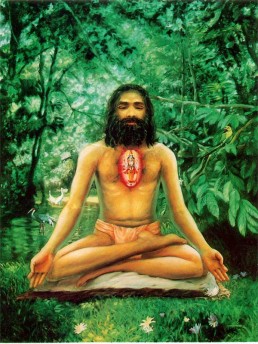Swami Chinmayananda
Swami Chinmayananda Commentary
In the Mahabharata, Krishna is conceived as a voluntary manifestation of the Supreme and hence He is addressed as Shri Krishna Paramatman. He is giving here an advice to His most intimate friend and life’s companion, Arjuna, on the methods of self-development and the techniques of self-perfection. Even then, it is not said that the Lord will give him a secret method by which he will not have to make any struggle at all and that the entire responsibility will be borne by the Creator of the Universe. The very opening words of the stanza weed out any such false hopes in the minds of the seekers. “O MAN OF SELF-CONTROL (YOGI), YOU SHOULD CONSTANTLY PRACTISE CONCENTRATION.” It is only through the practice of meditation that a mortal can grow out of his weaknesses and flower forth culturally into the greater perfection-possibilities within himself.
Details of how the meditation is to be conducted are given in the rest of the stanza. “SITTING IN SOLITUDE,” one should practise meditation. This word has been, unnecessarily, so overstretched in recent times in India that the term “meditation” brings a sense of horror and fear into the minds of the early seekers. It does not mean that meditation can be practised only in the jungles and in the solitude of caves. It only means that the seeker should try to withdraw himself from his mental and physical preoccupations and should retire to a corner in his house, for the purpose of early meditation.
Solitude can be gained only when there is a mental withdrawal from the world outside. One who is full of desires and constantly meditating upon the sense-objects, cannot hope to gain any solitude even in a virgin forest. Again, the word solitude (Rahasi) suggests a meaning of secretiveness, indicating that religion should not be a broadcast of self-advertisement, but must be a set of true values of life, secretly practised within the heart, ordering our way of thinking and encouraging our pursuit of the nobler values in life.
PHYSICALLY ALONE (Ekaki) — For the purpose of meditation, when one strives, his success in inward quietude will be directly proportional to the amount of self-control he is practising in his daily life. Self-control is not possible unless we know how to free ourselves from the “eagerness to possess” and the “anxiety to hoard.” To renounce our preoccupations with our endless plans for possessing more is indicated here by the term “free from hope” (Nirashih). And the term “free from possessions” (Aparigraha) indicates all our anxieties in saving, hoarding and protecting what we possess.
When one, well-established in these necessary physical self-controls and essential mental and intellectual habits, sits meditating upon the Truth in all secrecy, he is a true seeker striving on the right path to achieve and acquire the highest that is possible in life.
NOW, IN THE SEQUEL, THE LORD PROCEEDS TO PRESCRIBE FOR THE YOGA-PRACTITIONER PARTICULAR MODES OF SITTING, EATING, RECREATION AND THE LIKE, THAT ARE AIDS TO YOGA. FIRST OF ALL, HE EXPLAINS THE MODE OF SITTING AS FOLLOWS:
Adi Sankara Commentary
A yogi, a man of meditation; satatam yunjita, should constantly concentrate; atmanam, his mind; sthitah, by staying; rahasi, in a solitary place, in mountain caves etc.; ekaki, alone, without any companion; yata-citta-atma, with mind and body controlled; nirasih, without expectations, free from hankering; and aparigrahah, free from acquisition. From the uise of the qualifying words, ‘in a solitary place’ and ‘alone’, it follows that (he has to undertake all these) after espousing monasticism. And even after renunciation, he should concentrate his mind by desisting from all acquisition. This is the meaning. Now then have to be stated the rules regarding seat, food, movements, etc. as disciplines for yoga in the case of one practising concentration; as also the signs of one who has succeeded in Yoga, and the consequent result etc. Hence this is begun. Among these, the seat is being first spoken of:
The Bhagavad Gita with the commentary of Sri Sankaracharya – Translated by Alladi Mahadeva Sastry
Holy Geeta – Commentary by Swami Chinmayananda
The Bhagavad Gita by Eknath Easwaran – Best selling translation of the Bhagavad Gita
The Bhagavad Gita – Translation and Commentary by Swami Sivananda
Bhagavad Gita – Translation and Commentary by Bhaktivedanta Swami Prabupadha
Srimad Bhagavad Gita Chapter 6 – Verse 10 – 6.10 yogi yunjita – All Bhagavad Gita (Geeta) Verses in Sanskrit, English, Transliteration, Word Meaning, Translation, Audio, Shankara Bhashya, Adi Sankaracharya Commentary and Links to Videos by Swami Chinmayananda and others – 6-10

